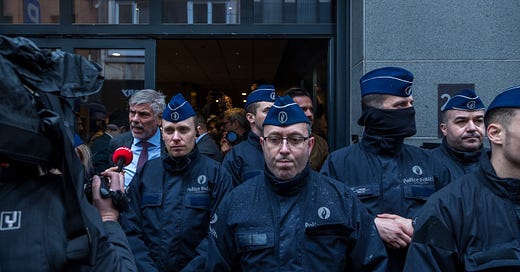
The Free Press

In Brussels yesterday, police shut down a gathering of prominent European right-wingers after the local mayor banned the event to “ensure public security.”
Speakers at the National Conservatism Conference included Hungarian prime minister Viktor Orbán, Brexit standard-bearer Nigel Farage, French politician Éric Zemmour, and Suella Braverman, who was, until recently, Britain’s home secretary. In other words, this was not a group of brownshirted goons planning a street fight, but major figures on the European political right, ranging from the mainstream to the more radical.
In a farcical-sounding standoff, a group of cops entered the event as Farage was speaking, then retreated. It was less of a shutdown and more a blockade: attendees were banned from entering or reentering. By all accounts, there was no violence, but a mighty media scrum at the door, major disruption, and understandably outraged attendees trapped in the building.
Look at any case of contemporary censorship and you will almost always find the same justification for silencing an unwelcome voice—safety. The rationale will invariably be light on specific threats—and is, in reality, a cowardly cover for an ulterior motive.
Yoram Hazony, the event’s organizer, said there was “no threat to public order” at the gathering. And I believe him. Belgian authorities have cited no specific threats. And as someone who has covered National Conservatism gatherings in the past, I find the idea that this tweedy crowd would get into any scraps difficult to believe. The only risk to my safety was nearly dying of boredom at a breakout session on common good constitutionalism.
But of course, public safety isn’t what this is really about. Hazony’s event was targeted because of objections to the ideas being discussed there.
Hazony takes it as a sign that he and his ideological comrades are onto something. “They tried to shut down this conference because they know that national conservatism is the greatest threat to the totalitarian, liberal NGO-cracy in Brussels,” he told The Free Press. (Note how such bans flatter the ideas they target: NatCon opponents should be among those most frustrated by this censorship.)
The second day of the conference is due to take place today and Hazony was adamant that the show would go on. “NatCon Brussels will continue undeterred.”
Ayaan Hirsi Ali notes that Emir Kir, the mayor who ordered police to shut down the event, is no stranger to extremism. He was expelled from Belgium’s Socialist Party after he met with a delegation that included representatives of a far-right, ultra-nationalist Turkish party.
Hazony’s politics could hardly be more different to those of Asna Tabassum, an undergraduate at the University of Southern California, but she faced the same cowardly excuse for censorship this week: “safety.”
Tabassum was selected as USC’s valedictorian, but as well as having a top-notch GPA, Tabassum appears to possess some, shall we say, robust views on Israel.
Several student groups complained about her selection and pointed out that Tabassum’s Instagram bio links to a post full of noxious anti-Israel rhetoric, including a description of Zionism as a “racist settler-colonial ideology”—in other words, the sort of thing professors are teaching college kids at top schools across the country. One group, Trojans for Israel, said that by choosing Tabassum as valedictorian, USC had turned commencement into an “unwelcoming and intolerant environment for Jewish graduates and their families.”
USC is not famous for its commitment to free expression—it once suspended a professor for simply saying a Chinese word that sounded like a racial slur. And the school had a decision to make. Administrators could have said they had made a mistake in picking Tabassum because her views were at odds with USC’s values and stripped her of the role. Or they could have stuck by Tabassum and ridden out an uncomfortable commencement day in the name of free speech. Instead, they opted for a weaselly fudge, keeping Tabassum as valedictorian but preventing her from speaking.
“Tradition must give way to safety,” said Provost Andrew T. Guzman in a letter to the USC community. It made references to the “alarming tenor” of the response to Tabassum’s selection and “substantial risks relating to security and disruption at commencement” but was light on specifics.
Tabassum called the decision “cowardly” and accused the school of “succumbing to a campaign of hate meant to silence my voice.”
USC had no constitutional obligation to select Tabassum as valedictorian. It does have a duty to be straight with students and faculty about its decision-making.
Alex Morey, director of campus rights advocacy at the Foundation for Individual Rights and Expression (FIRE), told The Free Press she thought USC’s decision was “a very calculated move” designed “to avoid censoring the student or yanking her valedictorian status, instead blaming ‘safety concerns.’ ”
“The suggestion is that authorities are concerned about true threats, but rarely is that the case,” says Morey. “If there are genuine safety concerns that local authorities simply can’t handle, the school must be as transparent as possible. The alternative is that they end up looking like censors trying to cover their tracks. That, of course, can chill campus speech.”
In Brussels and Los Angeles, the targets of censorship could not have been more different. But the insincere justification was the same.
Oliver Wiseman is a writer and editor for The Free Press. Follow him on X @ollywiseman.
And become a Free Press subscriber today:














In my high school, I remember that 2 students had identical GPAs, and the not Chinese one was arbitrarily chosen as valedictorian. In my college, I don't remember any valedictorian selection. USC selected a polarizing person as valedictorian among 100 students with identical GPAs. Maybe USC should drop the idea that one student is better than 99 others simply because she wore a headscarf. The selection process seems to always put Asians last and minorities first, regardless of their extra curriculars and other factors that should be more important.
I really, really liked what a neighboring school district used to do about high school graduation speakers in the early 2000s. You'd have you valedictorian and salutatorian, who would be acknowledged, but they were not automatically the speaker. The top 10% of the class was invited to submit a speech, totally optional, identified only by student ID number, judged by a panel of teachers and a few on the PTA. The winner would be the speaker, and the identity would be shown after the vote.